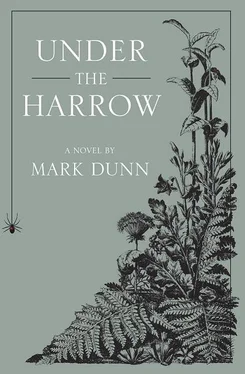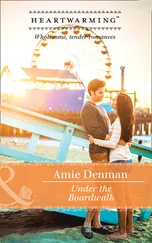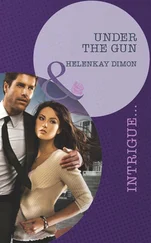It was clear that the time had now come for Newman Trimmers to come down from the wooded hills and find a settlement of some sort that would provide a morsel or two of food to keep starvation at bay. Perhaps he might discover something palatable in the town dustbins, or best of all meet a kindly baker who would take pity on a hungry, ragged boy and tender him a mouldy bun. The thought of the chance to put something into his empty stomach made Newman bold, and so he rose from his pallet of moss and leaves and made his way out of his secluded retreat.
In less than an hour my nephew was standing upon the side of a gravelled road, and wondering where it would take him. Would it lead to someplace where he might nourish himself? Where he could sleep soundly between linen sheets and restore himself for the purpose of essaying once again his long and wending journey home? The answers to these questions would come in time.
For now he must go down the gravelled road. And this he did. By and by, he came to a junction. Upon the shoulder of a smoothly paved thoroughfare stood a directing sign affixed to a metallic post. It said, “Jersey Shore 6 miles.” Thought Newman, Am I near the strand of a sea, or is there some great lake close by? (For what else could be the literal meaning of a place called Jersey Shore, except that it should be a littoral one?)
Within the half-hour, Newman had grown slightly less alarmed by the Outland conveyances that raced past him — vehicles of all shapes and sizes. Some were built like waggons and chaise-carts with room for ample storage in the open rear; others resembled Dinglian vans and Pantechnicons with room for storage within. Then there were those that carried only passengers (and perhaps a little something in their boots); and every now and then there came along a great myriad-wheeled monster machine with room enough inside to hold the entire contents of a railroad boxcar. These belched a most acrid-smelling smoke and sometimes blared their horns like the trumpetings of great elephants (or what Newman thought that great elephants should sound like, having never heard one). The loudness of the blasts compelled him in every instance to cover his delicate ears and hasten from the shoulder. Yet he never put himself at such distance from the road that he couldn’t feel the whoosh of the warm air being displaced by the prows of the massive man-made beasts.
A driver of one of the smaller vehicles had stopped alongside him to ask if he would like a “lift.” Though Newman knew the word to indicate in Dingley Dell a hoisting device, he assumed that this was the Outlander’s word for “ride.” The cordial old gentleman in the rusting conveyance had asked if Newman should like to be taken somewhere.
Yet, after his rude treatment by the Ryersbachs, Newman trusted no one — not even courteous old men who seemed upon first glance to be well-meaning.
“Thank you for your most kind offer, sir, but I should like to walk,” answered Newman.
“I’m going to Lock Haven,” said the man, as if he had not quite heard Newman’s declination.
“I do not mind long morning rambles. In point of fact, I am rather fond of them. Good day, sir.” Newman nodded to indicate that the parley was over and resumed his steps.
The old man sat and thought for a moment and then shrugged and said, “Suit yourself,” and steamed away.
After the gentleman had gone, Newman halted himself and took a few deep, calming breaths. He had pictured the man grabbing at him as had the men in the Ryersbach parlour — trying their best to hold and detain him, for what purpose Newman knew not, and possessed of hard looks that did not put his concerns to rest by any measure. Newman vowed in the midst of his narrow escape never to be trusting again, always to be vigilant, and never again to place himself into the custody of anyone who might wish to do him harm.
The boy renewed his steps but soon stumbled over a jutting rock and well nigh fell. He was tired and his feet were dragging themselves shufflingly upon the ground, and the hardship of his present situation was not in the least mitigated by the wearing of trowsers much too long for his short legs — trowsers that continued to unfold their makeshift cuffs, only to be trod upon and tripped over to break his stride and nearly break his neck.
I must have some new clothes, thought Newman. These clothes of Chad’s, which were given me, are much too big. I look like a harlequin clown.
Newman stopped himself every now and then to place his hand upon his stomach as if this action would somehow ameliorate his pangs of hunger. He was tired and weak and wanted now to sit upon a log and rest himself, but he feared that in doing so he might never rise up again. So onward he trudged along the side of the road, regretting now for the first time his decision to leave Dingley Dell.
This was a strange new feeling that had taken hold of Newman, and arriving in the thick of his travails, it fascinated him. He thought of what had made him depart Dingley Dell in the first place: he had been different from the other boys at the two schools he had attended. There were those who had said that he wasn’t very bright, that he was “walking trouble” and would never improve. He had always looked to the ridges and wondered if there were those who lived beyond them who were more like he was: the imp who had grown into a bit of a hellcat, and who was destined to mature into a fully-fledged delinquent and then finally find himself, at the unfortunate close of his life, a permanently-installed inmate of the Dingley Gaol. Perhaps, he thought, there was some truth to the statement made by the greengrocer from whom he had once purloined a plum, that he had a “criminal nature in embryo.” For had he not stolen Mr. Chowser’s greatest treasure, his grandfather’s watch? Had Newman not stuffed his knapsack with as much food as he was able to pilfer from the Chowser pantry? Embryo ? Come, come now. The miscreant was already hatched!
Yet Newman Trimmers didn’t feel like a miscreant. He felt like a boy — a lost boy who wanted only one thing: to return to his mother and father and, yes, even to his sister. Though she nettled him, Alice was still a part of that family that he so sorely missed after all the lonely days he’d spent in this strange and threatening foreign land.
As Newman was walking along deliberating upon his present situation, he noticed out of the corner of his eye a very red vehicle, open-topped like a Dinglian barouche, approaching him at great speed. It rode very low to the ground and as it sped past, it put a buzz into his ears. The vehicle gave him something else as well — a present of sorts: a bulging paper bag, tossed out by one of its boisterous passengers. The discarded bag landed not so very far from Newman’s feet. It had writing on it. It said “Burger King. Home of the Whopper.” Newman bent down and retrieved the bag. He opened it to discover a container inside, which caused his heart to leap. It had half a sandwich in it! The bread was in the shape of a flat round bun and the meat encased within had been flattened quite successfully into a patty. There was a layer of thin cheese melted upon the meat, and there were greens and slices of tomato stuffed inside as well. Newman smelt the sandwich and agreed with his nose that it should be quite edible. Also within the bag was a closed cardboard tumbler with dark liquid spilling from it and moistening the sides of the bag so that it nearly dropt away from his grasp in its sodden weakness. Newman devoured the strange meat sandwich, which tasted good to him, though it was quite salty. He devoured, as well, the savoury fried food sticks he also found inside; these tasted like potatoes, but only a little. Newman drank some of the dark liquid that swam amongst melting rimes of ice, and liked the sweetness that met his tongue.
Читать дальше












